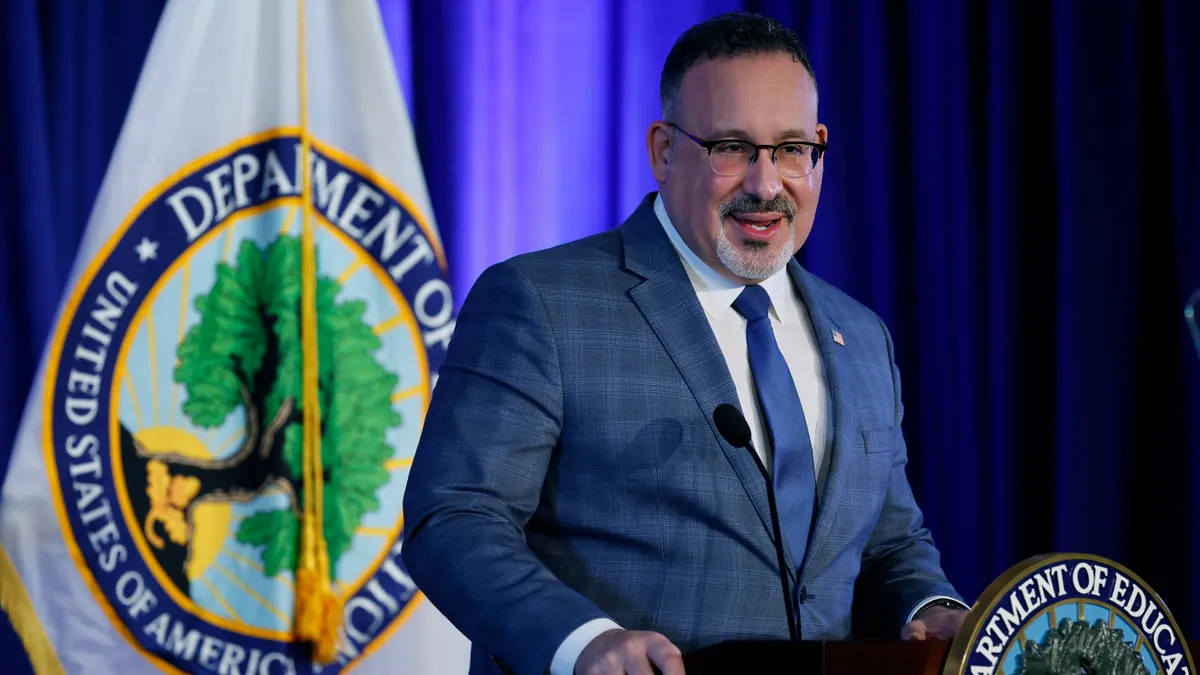Dive Brief:
- The U.S. Department of Education on Tuesday released the first set of draft regulations aiming to provide widespread debt relief to certain groups of student loan borrowers, including those who owe more than their initial balance due to ballooning interest.
- The proposals would also offer relief to borrowers who have been making payments for over two decades and those who would be eligible for loan forgiveness under other agency programs but haven’t enrolled in them. And it would clear debts for borrowers who attended colleges that didn’t provide them with "sufficient financial value," according to the department.
- The public will have 30 days to comment on the draft rules once they are published in the Federal Register, which is expected on Wednesday. The Education Department also plans to release a separate regulatory proposal in the coming months to provide debt relief to borrowers facing financial hardship.
Dive Insight:
The draft regulations represent President Joe Biden’s second attempt to carry out widespread loan forgiveness after the U.S. Supreme Court struck down his initial plan last year.
The Biden administration predicts the proposals would eliminate all accrued interest for 23 million borrowers, fully clear student debts for more than 4 million, and provide at least $5,000 in loan forgiveness for over 10 million.
“Today's announcement shows that the Biden-Harris Administration is continuing to fulfill our promises to fix a broken higher education system," U.S. Secretary of Education Miguel Cardona said in a statement Tuesday.
The agency aims for the final rules to deliver debt relief starting this fall, signaling that the administration will make them a regulatory priority during an already packed year.
Some student advocate groups praised the proposals shortly after the department announced them Tuesday.
“Today’s proposals are part of an ongoing acknowledgment that our debt-financed higher education system fails to provide a reliable path to financial security for too many students — and that repayment protections have been insufficient and too difficult to access,” Sameer Gadkaree, president of the Institute for College Access and Success, said in a statement.
However, Republicans have widely derided the proposals, arguing they seek to circumvent the Supreme Court’s ruling and put taxpayers on the hook for student debt relief.
“Mr. President, you have no legal ground to stand upon,” Rep. Virginia Foxx, the North Carolina Republican who chairs the House’s education committee, said in a statement Tuesday. “Your scheme is not steeped in benevolence or goodwill. It is mired in utter contempt for the Supreme Court and every student, family, and hardworking taxpayer in this country.”
The Biden administration previously attempted to pursue loan forgiveness under the Heroes Act, a 9/11-era law that allows the U.S. education secretary to rework federal student loan programs during times of emergency. However, Supreme Court Chief Justice John Roberts ruled that the administration could not pursue mass loan forgiveness through this avenue.
This time, the Biden administration is seeking regulatory changes under the Higher Education Act.
The draft regulations are just one item on the Education Department’s broad policy agenda this year.
For instance, the agency has promised to deliver two rules governing Title IX, the sweeping law protecting students from sex-based discrimination in federally funded colleges and K-12 schools.
One rule would dictate how colleges investigate and punish sexual violence, while the other would prohibit blanket bans on transgender students participating on sports teams that align with their gender identities.
The Education Department has repeatedly delayed the release of these two rules, which the agency first said would be finalized last May.
Some Title IX experts have speculated that the department will finalize the regulations by the summer. But the Washington Post recently reported that the Education Department planned to put off the sports-related rule until after this fall's elections.
Additionally, the agency has said it plans to release draft regulations on several other higher ed issues — including accreditation, distance education and third-party servicers — in October.
Meanwhile, the Education Department is fighting several legal challenges over other regulatory efforts.
At least two state-led lawsuits are pending against the department’s new income-driven repayment plan. That policy automatically clears debts for borrowers who took out $12,000 or less in student loans after they’ve made payments for 10 years.
And just this month, a federal appeals court blocked the Biden administration’s borrower defense rules, which provide debt relief to students who were defrauded by their colleges. Although student advocates praised the regulations for making it easier for students to get debt relief, the three-judge appellate panel said a pending lawsuit against the program is likely to succeed.














